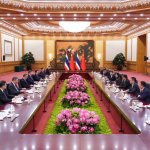
With a crisis raging in the African Congo, the then-UN Secretary-General Dag Hammarskjöld set off in 1961 to broker a ceasefire with Moise Tshombe, the leader of the secessionist State of Katanga. Yet Hammarskjöld tragically died after the DC-6 carrying him to the talks crashed in Northern Rhodesia, or what is now Zambia. Although peace in the Congo escaped him, the Swedish economist is widely considered the best diplomat to ever hold the office and remains the only posthumous winner of the Nobel Peace Prize.
Other former Secretaries-General have made tried to make their mark on the organization, including the late Kofi Annan, who committed the UN to reform after the genocide in Rwanda decimated the organization’s credibility. Annan’s reform agenda included strengthening the rule of law, human rights and democracy, as bold proposals to remake the Security Council reflective and representative of the modern international community. His tenure saw the creation of the Human Rights Council.

Most critics haven’t been as kind to the last two holders of the office. South Korea’s Ban Ki-moon was labeled by the Wall Street Journal as the UN’s “invisible man,” a reflection of his struggles to make an impact or cement a legacy for himself. While Ban’s crowning achievements included shepherding the UN through the Post-2015 Development Agenda and the Paris Climate Agreement, his term was marred by the UN bringing cholera to Haiti when the sewage from a UN peacekeeping base contaminated a major water supply. The UN was late to apologize, and still today it has been slow to compensate victims for their losses. Although Ban’s time as Secretary-General was quiet, his Human Rights Up Front (HRUF) initiative was among the most innovative, as it sought to push the UN to act more coherently and come to the aid of people caught in the middle of violent conflict, such as that in Sri Lanka.
Portugal’s Antonio Guterres took office in 2017, previously serving as the UN High Commissioner for Refugees (UNHCR) from 2005 to 2015 and prior to that, as his country’s Prime Minister. His election was mildly contentious, getting the approval of the Security Council and the General Assembly after securing more support than several more qualified female candidates, which included former New Zealand Prime Minister and UN Development Programme administrator Helen Clark. To claim that Guterres’ first five years at the helm were impactful or memorable would be a gross overstatement. At one time dubbed by a scorching critic as the “Portugese Ban Ki-moon”, Guterres has been beyond just soft or quiet. He has been morbidly ineffectual, and worse, utterly silent on some of the most consequential human rights crises of our time.
Guterres’ first term coincided with authoritarian resurgence, particularly in East and Southeast Asia, which preceded human rights abuses in Myanmar and in the Xinjiang Uyghur Autonomous Region (XUAR) in Western China. Beijing’s persecution of the Turkic-speaking Uyghur Muslims has raised serious concerns and is tantamount to genocide in the view of many observers. In the face of countless calls for intervention and investigation, Guterres remained silent.
When David Kaye, the former UN Special Rapporteur on the Promotion of the Right to Freedom of Expression, among others, called for an independent mechanism to respond to human rights abuses in both Xinjiang and Hong Kong, Guterres was silent. Calls for the appointment of a UN Special Envoy went unanswered. When a slew of human rights groups in 2019 called on the Secretary-General to condemn China’s abusive policies, Guterres was defiant. Instead, Guterres has preferred to “negotiate” with the Chinese government quietly, although this diplomacy has yet to bear any fruit. His quiet approach has led the former UN High Commissioner for Human Rights Zeid Ra’ad al-Hussein to roundly criticize his approach.
On the issue of Myanmar, Guterres has been ineffective and has paid little attention to the HRUF initiative created by his predecessor in 2013. Part of the problem is the ability of senior level UN staff, namely UN Resident Coordinators, which serve as the Secretary-General’s representatives in countries where the UN operates, to properly absorb and understand its underlying principles. HRUF was developed after failures in Sri Lanka and has a three-fold architecture. It aims to transform UN organizational culture, make changes that frame the UN’s work on human rights as a priority for all relevant UN agencies, and empower UN officials as they work with UN member states in achieving human rights goals. HRUF even supports more activist staff when raising the sensitive topic of threats to civilians and other humanitarian crises with government partners.
Guterres takes part of the blame in the UN’s failure in Myanmar when the UN Country Team failed to confront the former government about human rights abuses in Rakhine state. A leaked UN report found that the “situation in Rakhine state was forcing international institutions into complicity with systematic abuses” against the minority Rohingya. The UN failed to take charge of the human rights situation and were found to have been prioritizing development goals and continuing the quiet diplomacy practices of Guterres rather than fully utilizing HRUF.
Unfortunately, the Security Council just recommended Guterres to the General Assembly for a second five-year term as Secretary-General, the most crucial hurdle an SG candidate faces. His reelection is assured as is the continuance of failed diplomacy and arguably, the near abandonment of human rights advocacy on behalf of the Uyghurs in Xinjiang at a time when it is vital. The United Nations just reelected its worst-ever Secretary-General at the worst possible time.






